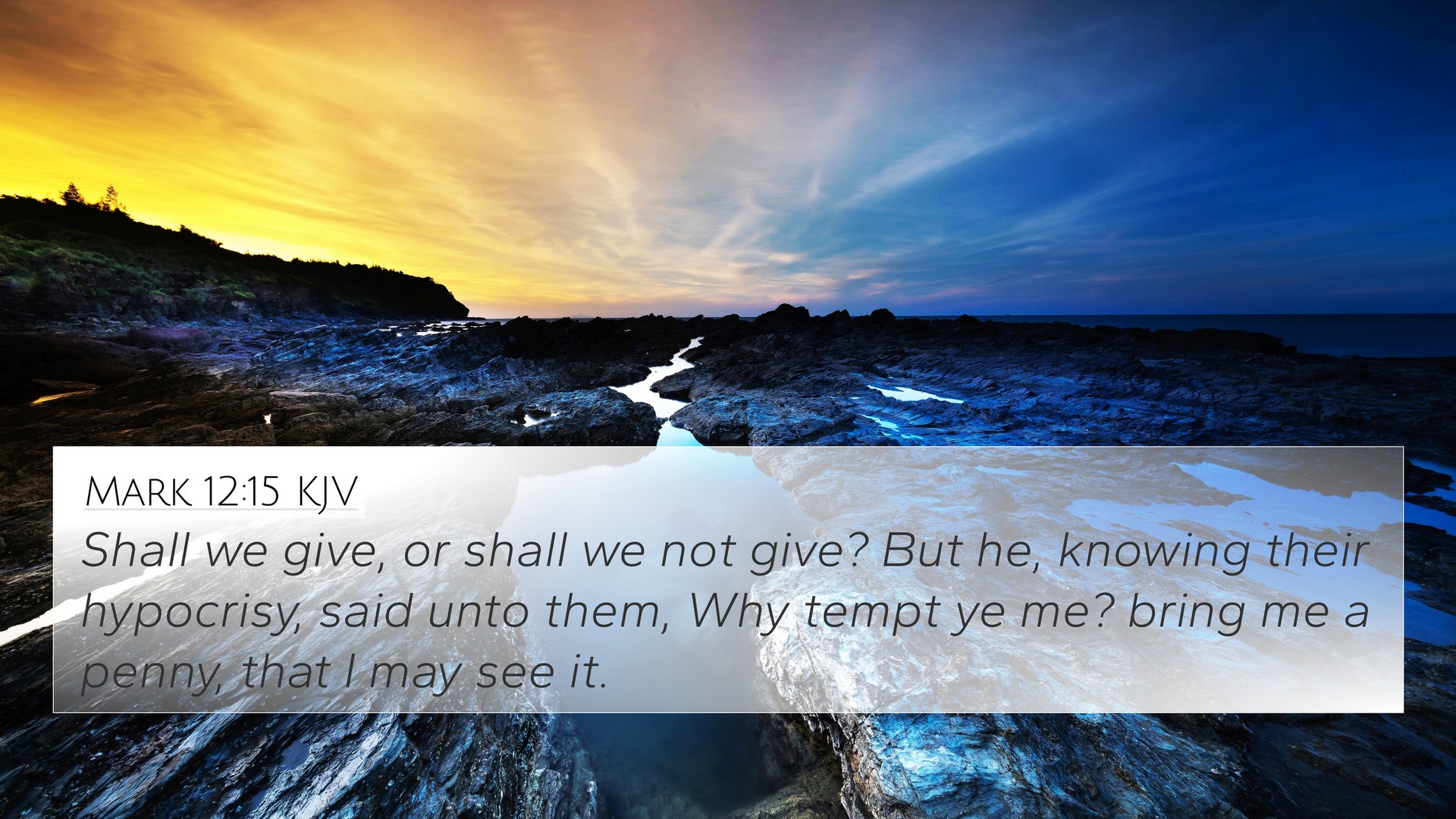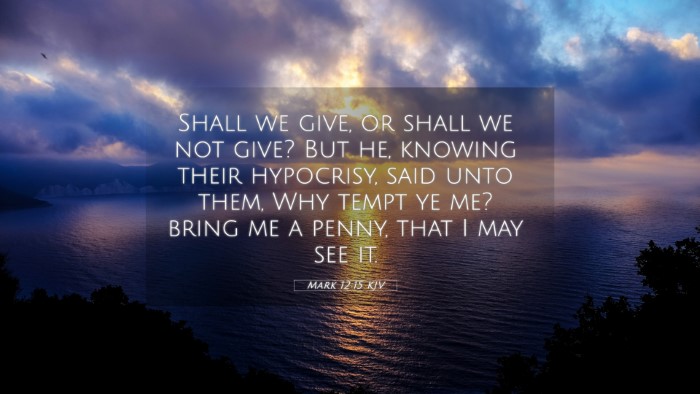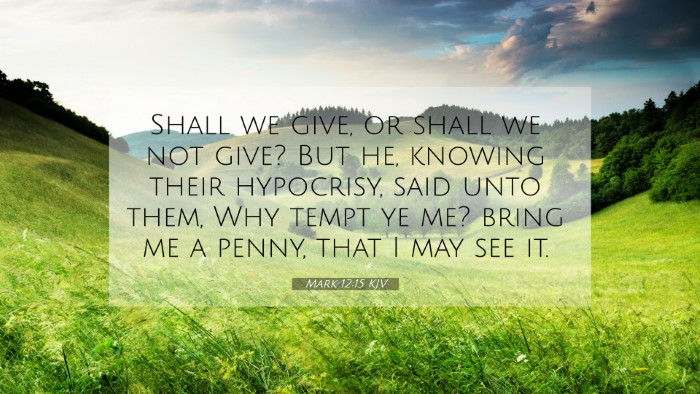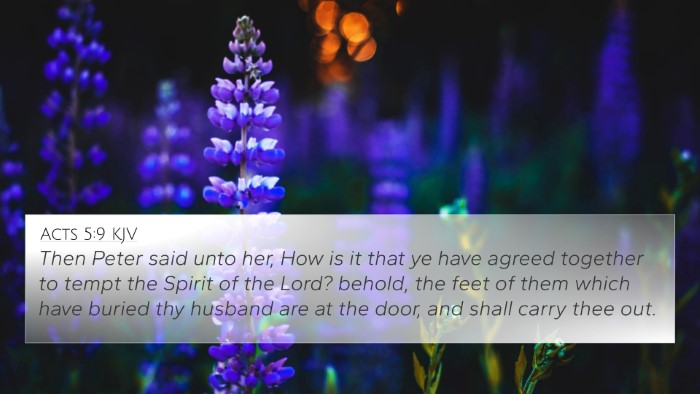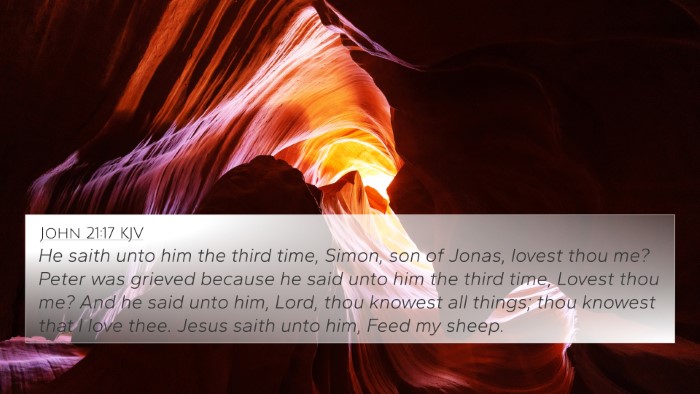Understanding Mark 12:15
Verse: Mark 12:15 - "Shall we give, or shall we not give?" But he, knowing their hypocrisy, said to them, "Why do you test me? Bring me a denarius that I may see it."
Summary of Mark 12:15
In this verse, Jesus responds to a question intended to trap him, illustrating His wisdom and discernment. The inquiry relates to the payment of taxes and the underlying implications regarding His authority and the religious authorities’ intent.
Commentary Insights
Several public domain commentaries offer detailed insights into this verse:
- Matthew Henry: Matthew Henry notes that this incident reveals the cunning nature of the Pharisees, who seek to entangle Jesus in a political dilemma. Henry emphasizes that Jesus, demonstrating His divine knowledge, brings their hypocrisy to light and directs attention to the coin, which holds more meaning than mere currency.
- Albert Barnes: Albert Barnes emphasizes the significance of the denarius as a Roman coin, symbolizing the worldly authority of Rome. He explains that by asking for the coin, Jesus points out the Christians' duty to both God and civil authorities, suggesting a balance between spiritual and temporal obligations.
- Adam Clarke: Adam Clarke expands upon the cultural context of the situation, noting the weight of taxation under Roman rule. He suggests that Jesus' response illuminates a fundamental principle—that while one may comply with civil duties like taxation, their ultimate allegiance belongs to God.
Thematic Connections and Cross-References
This verse not only stands alone in its profound implications but also connects to various themes throughout the scriptures. Here are some important cross-references:
- Matthew 17:24-27: Jesus discusses the temple tax, highlighting the distinction between obligations to earthly authorities and spiritual freedom.
- Romans 13:1-7: Paul teaches about the obedience to governing authorities, underlining that all authority is established by God.
- 1 Peter 2:13-17: Peter reiterates the call to respect human institutions while maintaining a higher allegiance to God.
- John 18:36: Jesus clarifies the nature of His kingdom, affirming that His rule is not physical but spiritual, referencing the separation from worldly governance.
- Acts 5:29: The apostles assert that obeying God takes precedence over human authority when there is a conflict.
- Psalm 62:11-12: Reflects on God’s ultimate authority and power, reinforcing the idea that while we live in a world with jurisdictions, we must acknowledge God as our true ruler.
- Proverbs 21:1: Notes that the heart of the king is in the hand of the Lord, indicating God’s sovereignty over earthly rulers.
- Luke 20:25: A parallel account where Jesus states, “Render therefore to Caesar the things that are Caesar's, and to God the things that are God's,” further reinforcing this theme of dual allegiance.
- Matthew 22:21: Simultaneously discusses the relationship between religious and civil responsibilities as illuminated by Jesus’ declaration regarding taxes.
- Philippians 3:20: Points to the believer’s ultimate citizenship in heaven, contrasting the temporary nature of earthly authority.
Tools for Bible Cross-Referencing
To deepen your understanding of Mark 12:15 and its thematic connections, consider utilizing the following tools:
- Bible concordance: A reference tool that lists words and phrases in the Bible, making it easier to find cross-references.
- Bible cross-reference guide: Provides contextual links between verses and themes across the scriptures.
- Cross-reference Bible study: Engaging in a study that focuses on how different passages interconnect to reveal deeper meanings.
- Bible reference resources: Books and online materials that offer insights on cross-referencing scripture effectively.
- Comprehensive Bible cross-reference materials: Collections or databases of cross-references that help in thematic studies.
Comparative Analysis and Interpretation
Conducting a comparative analysis between scriptures enhances our grasp of Biblical principles. When examining Mark 12:15 alongside similar verses, we observe the recurring theme of discerning spiritual obligations versus earthly responsibilities. This inter-Biblical dialogue not only informs our understanding of Jesus’ intents but also provides a framework for our conduct as believers in a temporal world governed by civil authority.
Conclusion
Mark 12:15 serves as a potent reminder of the dual citizenship believers hold—as subjects of earthly governance and as citizens of God’s kingdom. The rich connections to other scripture reveal a consistent call to wisdom, discernment, and fidelity to God amidst the complexities of our world. By exploring these connections, we can appreciate the layers of meaning within the text, enhancing our spiritual journey and our capacity to uphold our commitments to both God and society.
